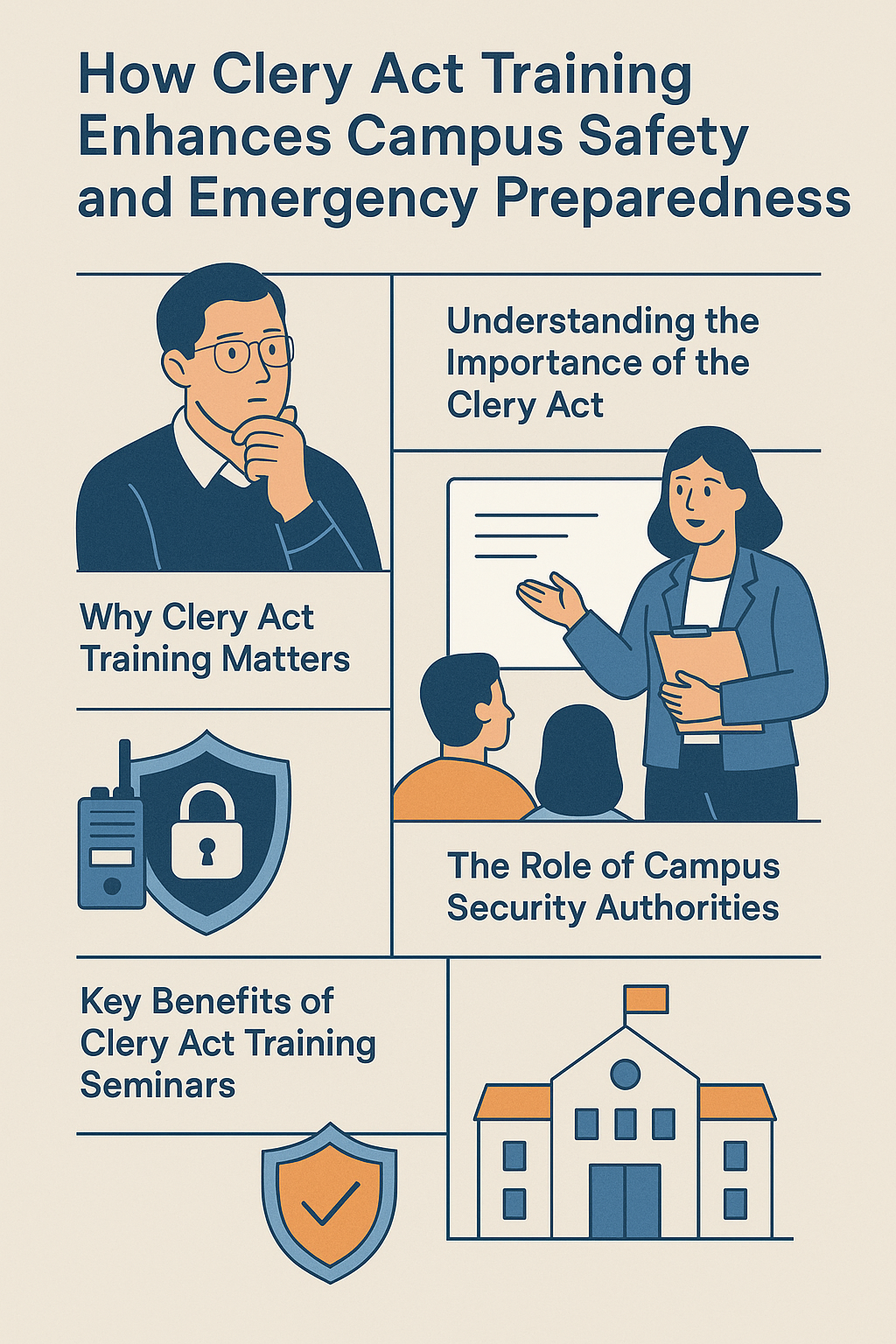How Clery Act Training Enhances Campus Safety and Emergency Preparedness
Understanding the Importance of the Clery Act
The Clery Act is a federal statute requiring colleges and universities to disclose information about crime on and around their campuses. Born from tragic events, the law emphasizes transparency, awareness, and prevention. Institutions must provide accurate crime statistics and maintain an annual security report that is accessible to all stakeholders.
For administrators, the responsibility extends beyond compliance. Proper understanding of the Clery Act statute ensures that campuses are safer, more transparent, and better equipped to handle emergencies. That is why Clery Act training is essential for both compliance and community protection.
Why Clery Act Training Matters
Clery Act training provides structured instruction for campus security authorities, staff, and administrators. These sessions empower professionals with the knowledge to correctly identify, classify, and report Clery Act crimes.
Institutions that invest in training avoid common pitfalls, such as misreporting incidents or failing to provide proper timely warnings. Effective training also enhances emergency notifications developing across different departments, ensuring faster and more accurate communication in a crisis.
The Role of Campus Security Authorities
Every institution designates campus security authorities to oversee safety and reporting efforts. These individuals are responsible for accurately documenting student or employee cases related to sexual assault, domestic violence, or dating violence.
Without training campus security authorities, compliance suffers, and victims may go unheard. Institutions that dedicate resources to continuous education foster stronger prevention and response efforts while protecting the rights of campus community members.
Key Benefits of Clery Act Training Seminars
Structured Clery Act training seminars provide participants with in-depth strategies to manage Clery Act compliance. Common benefits include:
- Clarity on reporting Clery Act crimes and ensuring accuracy in Clery Act crime statistics.
- Understanding Clery Act geography and identifying Clery geography counting responsibilities.
- Preparing for annual security report updates with confidence.
- Enhancing communication skills for issuing timely warnings.
- Building an actionable Clery compliance plan tailored to each campus's distinct needs.
Clery Act Training and Campus Safety
At its core, the Clery Act promotes campus safety by ensuring information is transparent and available. When faculty and staff undergo act training, they are better prepared to manage emergencies and protect the campus community.
Training instills confidence in leadership, making it easier to issue alerts, update the institution's annual security report, and align with promising practices recommended by the Clery Center.
Addressing Clery Act Geography
A major part of Clery Act training involves understanding Clery Act geography. Institutions must know where their responsibilities begin and end when reporting Clery Act crimes.
Through Clery geography counting and identifying Clery geography counting exercises, trainees learn how to track incidents within designated areas. This ensures compliance with both the letter and the spirit of the Clery Act statute.
Specialized Training Options
Modern institutions can choose from multiple forms of training:
- Virtual CATS sessions for remote teams.
- Self-paced CATS programs that allow flexibility.
- Instructor-led CATS trainings that focus on campus’s distinct needs.
This specialized curriculum supports institutions in creating a strong foundation for security reporting, incident classification, and emergency notifications developing.
Title IX and Clery Act Connections
Title IX and the Clery Act often overlap, particularly in cases of sexual assault, domestic violence, or dating violence. While Title IX addresses gender-based discrimination, the Clery Act requires reporting and transparency.
Trained staff learn how to manage domestic violence sexual assault cases in ways that satisfy both laws. Coordinated training strengthens institutional defenses against legal liability while improving prevention and response efforts.
Common Challenges in Clery Act Compliance
Institutions often face common challenges when preparing their annual security report or ensuring accurate Clery Act crime statistics. These challenges include:
- Inconsistent campus disciplinary procedures.
- Difficulty with issuing timely warnings.
- Lack of clarity in subjects covered during training.
Regular participation in Clery Center trainings and CATS programs helps administrators address campus-specific questions before they become compliance violations.
Enhancing Emergency Preparedness
The Clery Act requires institutions to provide timely warnings and implement strong emergency notifications developing strategies. Training ensures staff can act swiftly in the face of danger.
By applying lessons from act training and Clery Act training seminars, schools improve their ability to coordinate with campus police and protect the larger campus community.
Prevention and Response Efforts in Focus
Effective training emphasizes implementing prevention strategies alongside response efforts. This dual approach reduces risk while ensuring institutions are ready to act if an incident occurs.
Colleges that invest in an actionable Clery compliance plan and integrate training skills for staff demonstrate a proactive commitment to higher education safety.
Leveraging Clery Center Guidance
The Clery Center remains a vital resource for institutions seeking compliance. Through Clery Center trainings and materials, staff gain insights into promising practices that improve accuracy and transparency.
The partnership between campuses and the Clery Center underscores the importance of following both the letter and the intent of the law.
Building Stronger Campus Communities
At the heart of the Clery Act is the safety of the campus community. By investing in act training, schools build trust and confidence among students, faculty, and families.
When campus community members know that reports of sexual assault, dating violence, or stalking evaluating are taken seriously, engagement and safety improve.
The Role of Online Training
Institutions that cannot host in-person sessions often turn to online training options. These allow administrators and campus security authorities to complete requirements at their own pace.
Blended learning approaches combining virtual CATS and self-paced CATS resources ensure that training is accessible and effective.
Subjects Covered in Training
The CATS curriculum and other specialized curriculum options often cover:
- Clery Act geography and counting procedures.
- Accurate security reporting for crime statistics.
- Handling domestic violence sexual assault reports.
- Developing campus disciplinary procedures.
- Issuing timely warnings for critical incidents.

Campus Disciplinary Procedures and Compliance
One of the most scrutinized areas is how schools implement campus disciplinary procedures in student or employee cases. Inadequate or inconsistent processes lead to legal exposure.
Through Clery Act training seminars, administrators learn how to align these procedures with Clery Act compliance standards and federal requirements.
Creating Actionable Compliance Plans
An actionable Clery compliance plan is more than a checklist. It requires input from administrators, campus police, and campus security authorities.
By incorporating response efforts, training outcomes, and lessons from Clery Center trainings, schools build compliance structures that withstand audits and investigations.
Strengthening Prevention Programs
Part of training involves implementing prevention programs that address risks before they escalate. These programs may target issues like sexual assault, domestic violence, or dating violence.
With the support of cats trainings and self-paced CATS, institutions tailor prevention strategies to the campus’s distinct environment.
Evaluating Specialized Needs
Not every campus has the same risks. Large universities and small colleges face different challenges. Virtual CATS and tailored CATS curriculum allow administrators to address campus specific questions.
This ensures training aligns with the institution’s annual security report and reflects actual risks on the ground.
Building Skills for Lasting Change
Training programs emphasize practical training skills that empower participants to make immediate improvements. Whether through act training or Clery Act training seminars, skills developed are transferable across departments.
The ultimate goal is to create a safer, more transparent, and compliant learning environment in higher education.
Take the Next Step: Contact Us Today
If you are responsible for compliance, safety, or administrative oversight, now is the time to strengthen your institution’s commitment to transparency and protection. Our team provides expert guidance in Clery Act training, CATS trainings, and compliance planning so your campus is always prepared.
Whether you need help building an actionable Clery compliance plan, improving emergency notifications developing, or answering campus-specific questions, we can assist you.
Contact us at (888) 209-4055 to book a free consultation. Our experts are ready to help you implement effective training strategies, improve your annual security report, and ensure your institution demonstrates best practices in campus safety and emergency preparedness.








